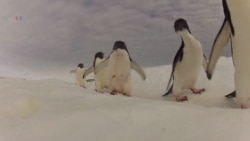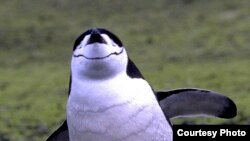About 75 percent of all penguins are threatened and a campaign to double the area of protected reserves is being considered by an international commission.
Penguins are aquatic birds. They do not fly. Instead, they soar through the ocean. Penguins are especially adapted to life in the water, and are affected by everything in it.
They suffer from pollution and overfishing, which limits their food source. They are in danger from shipping traffic and oil spills.
Sharp decline
Vanessa Strauss, who heads a high-tech tracking and monitoring program at the South African Foundation for the Conservation of Coastal Birds in Cape Town, South Africa, says accidents there have accelerated the birds' sharp decline.
“We know that some animals oiled at sea never make it to land," Strauss said. "So, it’s really difficult to quantify the impact of chronic oil pollution over the long term. We cannot only look at the number of birds affected by oil to quantify the impact, but we do know from research that many birds do die out at sea.”
Climate change puts all penguin populations at risk, says Andrea Kavanagh, director of Global Penguin Conservation for the PEW Charitable Trusts.
“Global warming is a problem because it shifts where their normal food supplies are, either farther away from them so they have to swim farther and farther away to get the food," Kavanagh said. "And when penguins are nesting and trying to protect their chicks, that’s especially a big problem for them, because the longer they have to leave their chicks, the more open to starvation and predation their chicks are."
Marine reserves
Two-thirds of the global penguin population is endangered, according to the International Union for the Conservation of Nature.
Eight of 18 species worldwide live in Antarctica. The continent, one of the last wild frontiers, is home to 10,000 species, including seabirds, seals and whales.
Kavanagh says PEW and partner groups are backing a plan to create two large marine reserves, which would set aside nearly 3 million square kilometers (1.16 million miles) in the Ross Sea and East Antarctica, more than a third of which would be a strict no-fishing area.
Marine reserves would help penguins by moving fisheries away from where the penguins forage for food, Kavanagh said. "And so it would give them a little bit more security when it comes to their food source in the face of a changing climate. The other thing that it would do is that it would take a big fishery that is happening, the krill fishery, and move that farther away from their foraging grounds.”
Negotiating fate of reserves
The tiny, shrimp-like krill are a staple of the penguin diet. But they are being harvested for fish feed and vitamin supplements.
A commission created under the Antarctic Treaty, which governs the continent, is currently negotiating the fate of the reserves.
The 24-member states and European Union countries must come to a consensus. Kavanagh says every nation is on board except Russia, which has been reluctant to give up fishing in the proposed area.
“The last couple of years, we have been working with our Russian colleagues and with all of the other member governments to try to understand their problems and see if we can work through them so that this year, this October, we can have these marine reserves firmly established,” Kavanagh said.
The meeting will be held in Tasmania, where the commission is based. The reserves would double the area of ocean worldwide that is fully protected.
Penguins are aquatic birds. They do not fly. Instead, they soar through the ocean. Penguins are especially adapted to life in the water, and are affected by everything in it.
They suffer from pollution and overfishing, which limits their food source. They are in danger from shipping traffic and oil spills.
Sharp decline
Vanessa Strauss, who heads a high-tech tracking and monitoring program at the South African Foundation for the Conservation of Coastal Birds in Cape Town, South Africa, says accidents there have accelerated the birds' sharp decline.
“We know that some animals oiled at sea never make it to land," Strauss said. "So, it’s really difficult to quantify the impact of chronic oil pollution over the long term. We cannot only look at the number of birds affected by oil to quantify the impact, but we do know from research that many birds do die out at sea.”
Climate change puts all penguin populations at risk, says Andrea Kavanagh, director of Global Penguin Conservation for the PEW Charitable Trusts.
“Global warming is a problem because it shifts where their normal food supplies are, either farther away from them so they have to swim farther and farther away to get the food," Kavanagh said. "And when penguins are nesting and trying to protect their chicks, that’s especially a big problem for them, because the longer they have to leave their chicks, the more open to starvation and predation their chicks are."
Marine reserves
Two-thirds of the global penguin population is endangered, according to the International Union for the Conservation of Nature.
Eight of 18 species worldwide live in Antarctica. The continent, one of the last wild frontiers, is home to 10,000 species, including seabirds, seals and whales.
Kavanagh says PEW and partner groups are backing a plan to create two large marine reserves, which would set aside nearly 3 million square kilometers (1.16 million miles) in the Ross Sea and East Antarctica, more than a third of which would be a strict no-fishing area.
Marine reserves would help penguins by moving fisheries away from where the penguins forage for food, Kavanagh said. "And so it would give them a little bit more security when it comes to their food source in the face of a changing climate. The other thing that it would do is that it would take a big fishery that is happening, the krill fishery, and move that farther away from their foraging grounds.”
Negotiating fate of reserves
The tiny, shrimp-like krill are a staple of the penguin diet. But they are being harvested for fish feed and vitamin supplements.
A commission created under the Antarctic Treaty, which governs the continent, is currently negotiating the fate of the reserves.
The 24-member states and European Union countries must come to a consensus. Kavanagh says every nation is on board except Russia, which has been reluctant to give up fishing in the proposed area.
“The last couple of years, we have been working with our Russian colleagues and with all of the other member governments to try to understand their problems and see if we can work through them so that this year, this October, we can have these marine reserves firmly established,” Kavanagh said.
The meeting will be held in Tasmania, where the commission is based. The reserves would double the area of ocean worldwide that is fully protected.










